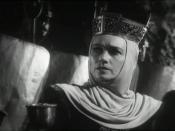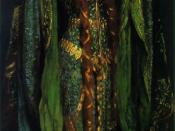Lady Macbeth's character
Using the corrosive, psychological and political effects evoked when combining ambition and malevolence, Lady Macbeth manages to achieve her goal - in persuading Macbeth. This is credited to her natural efficacious persuasion skills. In particular, her use of dark imagery deems to highlight her psychological mind-set as a character. As early as her first appearance in act 1 scene 5, it is already evident how odious she is mentally. After she reads the letter from Macbeth, she questions Macbeth's willingness to achieve the prophecy and comes to the conclusion that she has to interfere; "that I may pour my spirits in thine ear". This line holds many imbedded meanings as it coincides with Shakespeare's previous play Hamlet, where the King Claudius is murdered by poison administered through the ear. Giving the play Macbeth an early sense of foreboding and déjà vu, as the words said to Macbeth were like a poison manifesting in his mind until it eventually devours him, such as King Claudius.
Likewise, the phrase "my dark spirits", adds furtherly to the dark tone of the scene as the word "spirits" connotes images of the supernatural and death itself. The fact that Lady Macbeth uses the possessive pronoun "my", when talking about the spirits she intends to poison Macbeths mind with, not only adds another dark element of surprise into the already dark scene, but it also starts to introduce a form of independence to Lady Macbeth's character, who lived I a highly patriarchal society.
The expectation and normal characterisation of women back in the era that the play was written in, was very two dimensional, they were merely meant to be seen and not heard, positioned on a mantelpiece, to highlight the masculinity of the men who owned them. Lady Macbeth was...


